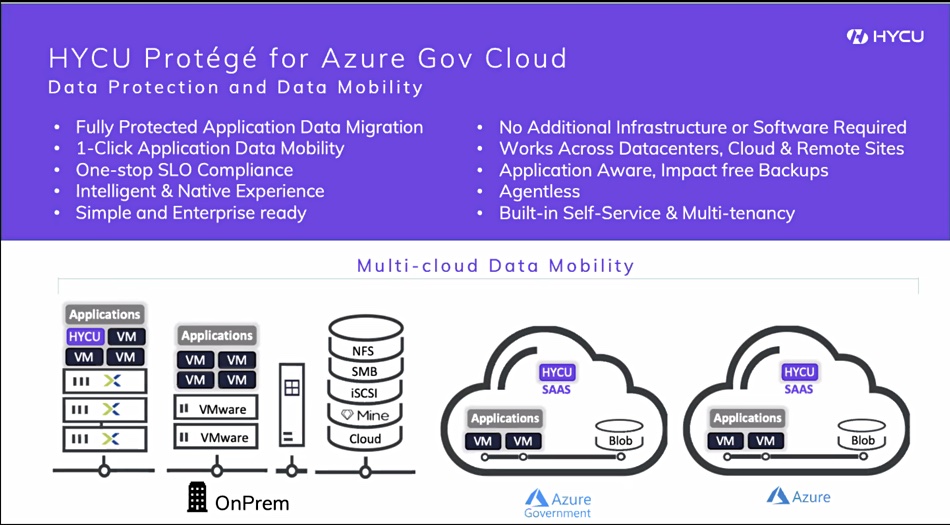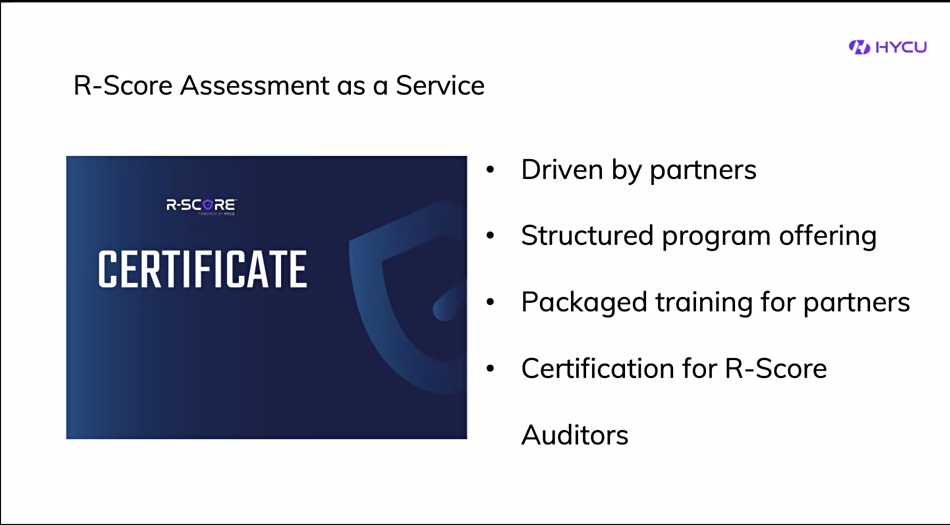A March update for HYCU’s Protégé backup offering adds support for Dell EMC Isilon and PowerScale systems, plus additional features such as Azure Government Cloud support.
Update. Additional HYCU views added. 5 April 2022.
HYCU presented its update to a March IT Press Tour in Tel Aviv, reminding attendees it began its life providing Nutanix-focussed backup, then added VMware, and subsequently added the Google, Azure and AWS public clouds in that order, with an agentless backup-as-a-service offering. Office 365 was supported in February last year, and Kubernetes-orchestrated cloud-native workloads in April.

Subbiah Sundaram, VP of product for HYCU, told attendees: “We integrate with Isilon’s native API, not using NDMP, whose use impacts production systems. Ours does not.”
That’s because NDMP uses host server CPU and memory resources whereas HYCU’s agentless backup does not. HYCU’s Protégé software can backup Isilon and PowerScale systems to on-premises Data Domain and ECS targets but also to the three top public clouds. In this way it can aid a customer’s migration to the cloud.
When it was mentioned that Druva can also backup source systems to the public cloud, and Dell has a tie-up with Druva, HYCU SBP sales Justin Endres said that Druva was AWS-specific and customers would prefer multi-cloud support. He also suggested that Dell-Druva deal was done in haste and Dell might be looking to widen its SaaS backup supplier relationship so as to gain multi-cloud target support.
Endres also said that Isilon/PowerScale customers moved to HYCU because relying on replica copy-based rather than backup-based protection didn’t scale well or extend easily to the public cloud. HYCU fulfils both requirements. Also Isilon customers came to HYCU because extending their legacy backup to the cloud was hard and HYCU made it easier. Commvault and Veritas were singled out in this regard, with Sundaram saying Commvault’s Metallic does not protect Isilon.
Other features in the March update were:
- Expanded WORM (Write Once Read Many) support including S3 object lock and its equivalent for Azure Blob and Google Cloud Object Storage;
- Zero trust security with partners offering services after education by HYCU;
- Migration from on-premises backups to the to Azure Government Cloud.

Asked if HYCU offered dedupe in the cloud, Sundaram said: “We don’t do dedupe in the cloud. It requires compute there and compute is expensive while storage and networking are cheaper. We only ship unique blocks to the cloud with a first fill backup and only unique blocks from incremental changes.” This is marketed as Cloud Smart with savings in backup storage capacity and faster recovery than restoration from a deduplicated backup store in the cloud. In effect HYCU gets dedupe done on the source system.
In the future HYCU could introduce data protection plus security with integration of its software with the native security management of the source platform so it could work with the identity management features there.
HYCU has an R-Score ransomware attack readiness score with a 0 to 1,000 rating and offers it as a free service to customers. It was created with help from Mandiant and, so far, it has been used more than 50,000 times.

It’s enabling its partners to offer this as a service with partners billing customers for its use. HYCU says this gives its partners something to compete against Google with its acquired Mandiant offering.
A HYCU spokesperson told us: “These new services for us are just a small but hopefully meaningful way in which our partners can add ransomware assessment to their ongoing practice areas – especially for those in that have security service and practice areas. I honestly don’t think any of us would ever think those capabilities for midsize enterprise-focused MSPs/MSSPs and CSPs would ever run up against the breadth and depth of what Mandiant currently offers and may offer now that they’re a part of Google. We still work with the Mandiant execs and engineers to fine tune R-Score that we introduced with them last August as well.”








